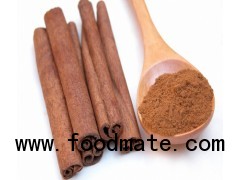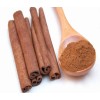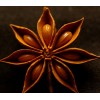|
Variety |
Cassia/Cinnamon |
|
Color |
Brown |
|
Processing |
AD |
|
Moisture |
16% Max |
|
Shape |
Whole/Stick/Slice |
|
Taste |
Natural Aroma |
|
Payment Terms |
T/T or L/C |
|
Port of Loading |
Fangcheng/Shenzhen |
|
Origin |
Guangxi, China |
Cinnamon is a popular cooking spice used in a variety of cultures. Made from the bark of certain tree species found in China, India and Southeast Asia, cinnamon is available in powder, capsule, liquid extract or stick forms. Not only does cinnamon flavor your favorite dishes, it is also used in folk medicine to treat medical problems.
Taste
Cinnamon sticks impart better flavor to foods compared to its powder counterpart. Cinnamon loses its flavor over time, whether it is in powder or whole form. However, ground cinnamon will degrade faster than whole sticks. Cinnamon sticks also have a longer shelf life than ground cinnamon. You can store cinnamon sticks for up to a year while cinnamon powder will only stay fresh for approximately 6 months. You can use a specially designed spice grinder or a coffee grinder to make ground cinnamon from your sticks to add to baked goods and other dishes.
Decorations
Cinnamon sticks also make a fragrant decoration around your home or office. Though you may associate the smell of cinnamon with autumn, you may use cinnamon sticks all year round. Place cinnamon sticks in a small vase for a pleasing air freshener. Another deodorizing option is to simmer the cinnamon sticks. Place them in a saucepan covered with water. Bring the water to a boil and then reduce the heat. Allow the cinnamon sticks to simmer for five minutes to provide a wonderful aroma throughout your house.
Health Benefits
Cinnamon has a number of potential health benefits. The spice may help lower blood sugar and cholesterol in people with type-2 diabetes. A 2003 study in “Diabetes Care” examined 60 people with type-2 diabetes. Researchers concluded that 1 gram, 3 grams or 6 grams of cinnamon daily decreased serum glucose, triglyceride, LDL cholesterol and total cholesterol levels in study subjects. Cinnamon also contains polyphenols, a type of antioxidant that can protect cells against free radical damage and prevent cardiovascular disease. The scent of cinnamon may help to boost mental alertness as well.
Precautions
Consult your physician before taking cinnamon to treat or prevent any health problems. The National Center for Complementary and Alternative Medicine reports that cinnamon is safe for most people when taking six grams or less daily for up to six weeks. However, some people may experience an allergic reaction. One of the more common types of cinnamon, cassia cinnamon contains coumarin, which hinders blood from clotting. Because of this, you should not consume large amounts of cassia cinnamon.
Cinnamon Powder Vs. Ground Cinnamon
That the same spice can have different names is nothing new; for example, cumin is sometimes called comino in areas such as Texas. Spices can also take different forms, such as onion powder and dehydrated onion bits. Sometimes the different names are just a matter of preference, and that's the case with cinnamon -- the spice-shaker-appropriate form is known as both ground cinnamon and cinnamon powder.
Identification
Cinnamon is the name given to different types of tree bark used as a spice and also serves as the genus name. Cinnamomum verum, or C. zeylandicum or Ceylon cinnamon, is considered real cinnamon, but Cinnamomum cassia, or Chinese cinnamon, is more commonly sold in the United States as cinnamon. Harvesters cut the inner bark of the tree into the curled "sticks" you can find in markets, and the bark is ground up into powder.
Household Uses
Cinnamon's everyday uses include seasoning and flavoring foods, and contributing its spicy scent to potpourri. You can eat cinnamon powder "uncooked," for instance, sprinkled on toast, or you can add it to foods like oatmeal while the cereal is cooking. Be aware that cinnamon is a classic case of a little going a long way, and it's relatively simple to overestimate how much you might need. Cinnamon powder can also be messy if you spill it, and if you leave some sitting on a dish for too long, it can stain the dish. A quick scrub with a paste of baking soda and water should remove the stains.










